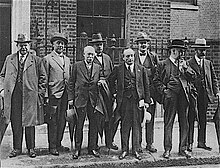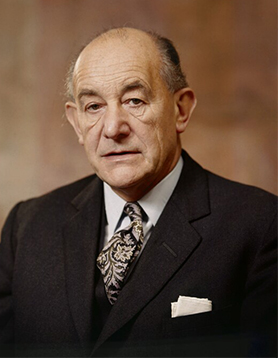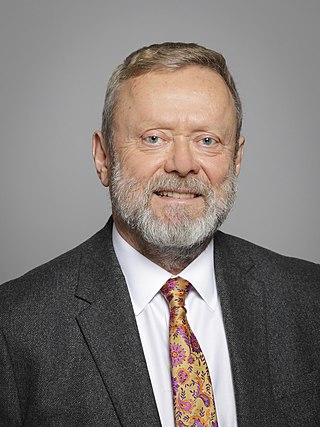
Alexander George Walkden, 1st Baron Walkden (11 May 1873 – 25 April 1951) was a British trade union leader and Labour politician.

Alexander George Walkden, 1st Baron Walkden (11 May 1873 – 25 April 1951) was a British trade union leader and Labour politician.
In 1906 Walkden was appointed the fourth General Secretary of the Railway Clerks' Association (the modern Transport Salaried Staffs' Association ) at a particularly important point in its history. His immediate predecessor, John Stopford Challener, had absconded with most of the union's money—a crime which was only discovered after he committed suicide in Paris. Walkden was an extremely able administrator and socialist, who in his thirty years as general secretary built up the impoverished union into a respected organisation which was influential in both the Labour Party and the trade union movement. In his period of office he was also influential in the creation of the International Transport Workers' Federation (ITF). At thirty years (1906–1936) he is the longest-serving general secretary in the history of the RCA/TSSA, his nearest rival being the fifteen years served by Richard Rosser between 1989 and 2004. When the union built its new headquarters building adjacent to London's Euston railway station in the 1960s, it was named Walkden House in his honour.[ citation needed ]
Walkden unsuccessfully stood for Parliament as the Labour candidate in Wolverhampton West at the 1918 general election, at a by-election in 1922 and at the 1922 general election. He was unsuccessful again in Heywood and Radcliffe in 1924,[ citation needed ] but was elected at the 1929 general election as Member of Parliament (MP) for Bristol South. [1] Although seriously ill for much of the 1929–1931 Parliament, Walkden was active in pressing for legislation to create London Transport, a long-time policy of the union. The Labour government fell before the London Passenger Transport Act could be passed, and he lost his seat in the 1931 general election but as a union leader, he pressed the subsequent National Government to reintroduce the bill, which it did in 1932, and it came into effect in 1933.[ citation needed ] Walkden was re-elected for Bristol South at the 1935 general election, serving until he retired from the House of Commons at the 1945 general election. [1] on 9 July 1945 he was elevated to the peerage as Baron Walkden, of Great Bookham in the County of Surrey. [2] He then served under Clement Attlee as Captain of the Yeomen of the Guard (Deputy Chief Whip in the House of Lords) from 1945 until 1949.
Lord Walkden died in April 1951, aged 77, when the barony became extinct.

The Transport Salaried Staffs' Association (TSSA) is a trade union for workers in the transport and travel industries in the United Kingdom and Ireland. Its head office is in London, and it has regional offices in Bristol, Derby, Dublin, York and Glasgow.

William Thomas Rodgers, Baron Rodgers of Quarry Bank,, is a British politician and life peer. As a Labour Party member of Parliament, he served as Secretary of State for Transport from 1976 to 1979, and was one of the "Gang of Four" of senior Labour politicians who defected to form the Social Democratic Party (SDP). He subsequently helped to lead the SDP into the merger that formed the Liberal Democrats in 1988, and later served as the party's leader in the House of Lords between 1997 and 2001.

Patrick Chrestien Gordon Walker, Baron Gordon-Walker, was a British Labour Party politician. He was a Member of Parliament for nearly 30 years and twice a cabinet minister. He lost his Smethwick parliamentary seat at the 1964 general election in a bitterly-racial campaign conducted in the wake of local factory closures.

Dick Taverne, Baron Taverne, is a British politician and life peer who served as Member of Parliament (MP) for Lincoln from 1962 to 1974. A member of the Liberal Democrats, he was a Labour MP until his deselection in 1972, following which he resigned his seat and won the subsequent by-election in 1973 as a Democratic Labour candidate.

Herbert John Harvey Parker was a British Labour Party politician. He was first elected as the Member of Parliament for Romford in November 1935. After boundary changes, he continued as MP for Dagenham from 1945, remaining in the House of Commons until he retired in June 1983. As the longest-serving MP, he was the Father of the House of Commons from 1979 to 1983. When he left parliament in 1983, he was the last serving Member of Parliament to have served in the Commons before the Second World War.
Christopher Paget Mayhew, Baron Mayhew was a British politician who was a Labour Member of Parliament (MP) from 1945 to 1950 and from 1951 to 1974, when he left the Labour Party to join the Liberals. In 1981 Mayhew received a life peerage and was raised to the House of Lords as Baron Mayhew. He is most known for his central role in founding the Information Research Department (IRD), a secret wing of the UK Foreign Office dedicated to Cold War propaganda.
George Henry Roland Rogers, CBE was a British Labour Member of Parliament.

Richard Andrew Rosser, Baron Rosser is a British former trade union leader and Labour politician, sitting in the House of Lords. He is the Shadow Spokesperson for Transport and Home Affairs for Labour in the House of Lords.
Raymond Jones Gunter was a British Labour Party politician. He was born in Wales and had a background in the railway industry and the British trade union movement – specifically his union, the Transport Salaried Staffs' Association (TSSA).
Walter Hamlet Johnson was a British Labour Party politician.

George Samuel Lindgren, Baron Lindgren, JP, DL was a British Labour Party politician.

Sir Richard Douglas Denman, 1st Baronet, was a radical British Liberal Party politician and Labour Party then National Labour MP.
The 1922 Wolverhampton West by-election was a by-election held for the British House of Commons constituency of Wolverhampton West in Wolverhampton on 7 March 1922. It was won by the Coalition Conservative candidate Sir Robert Bird.
Evelyn Walkden was a British politician and trade unionist.

Ray Edward Harry Collins, Baron Collins of Highbury is a British politician and trade unionist serving as a Member of the House of Lords since 2011. A member of the Labour Party, he served as General Secretary of the Party from 2008 to 2011. Collins has been Shadow Deputy Leader of the House of Lords since 2021.
Sidney Weighell was an English footballer, trade unionist and the General Secretary of the National Union of Railwaymen from 1975 to 1983.

Benjamin Tillett was a British socialist, trade union leader and politician. He was a leader of the "new unionism" of 1889, that focused on organizing unskilled workers. He played a major role in founding the Dockers Union, and played a prominent role as a strike leader in dock strikes in 1911 and 1912. He enthusiastically supported the war effort in the First World War. He was pushed aside by Ernest Bevin during the consolidation that created the Transport and General Workers' Union in 1922, who gave Tillett a subordinate position. Scholars stress his evangelical dedication to the labour cause, while noting his administrative weaknesses. Clegg Fox and Thompson described him as a demagogue and agitator grasping for fleeting popularity.

Herbert Stanley Morrison, Baron Morrison of Lambeth, was a British politician who held a variety of senior positions in the Cabinet as a member of the Labour Party. During the inter-war period, he was Minister of Transport during the Second MacDonald ministry, then after losing his parliamentary seat in the 1931 general election, he became Leader of the London County Council in the 1930s. After returning to the Commons, he was defeated by Clement Attlee in the 1935 Labour Party leadership election but later acted as Home Secretary in the wartime coalition.
The Dundee by-election was a Parliamentary by-election held on 9 May 1908. The constituency returned two Members of Parliament (MP) to the House of Commons of the United Kingdom, elected by the first past the post voting system.
The 1945 Dissolution Honours List was issued on 7 June to mark the dissolution of the United Kingdom parliament prior to the 1945 general election.
{{cite web}}: CS1 maint: unfit URL (link)